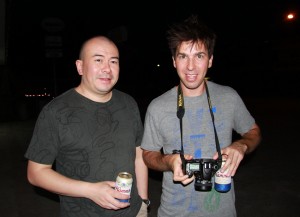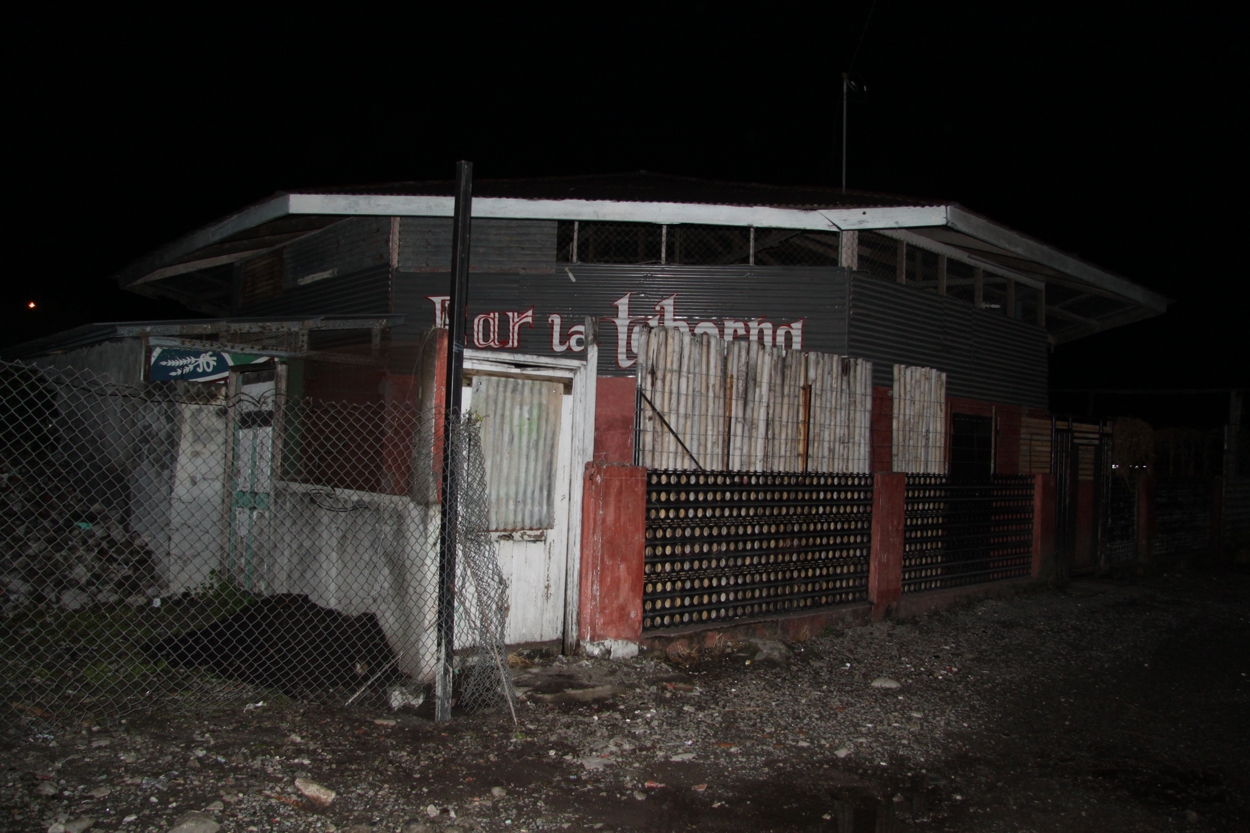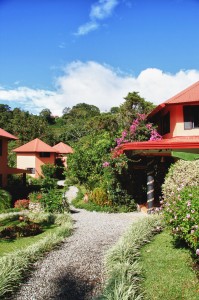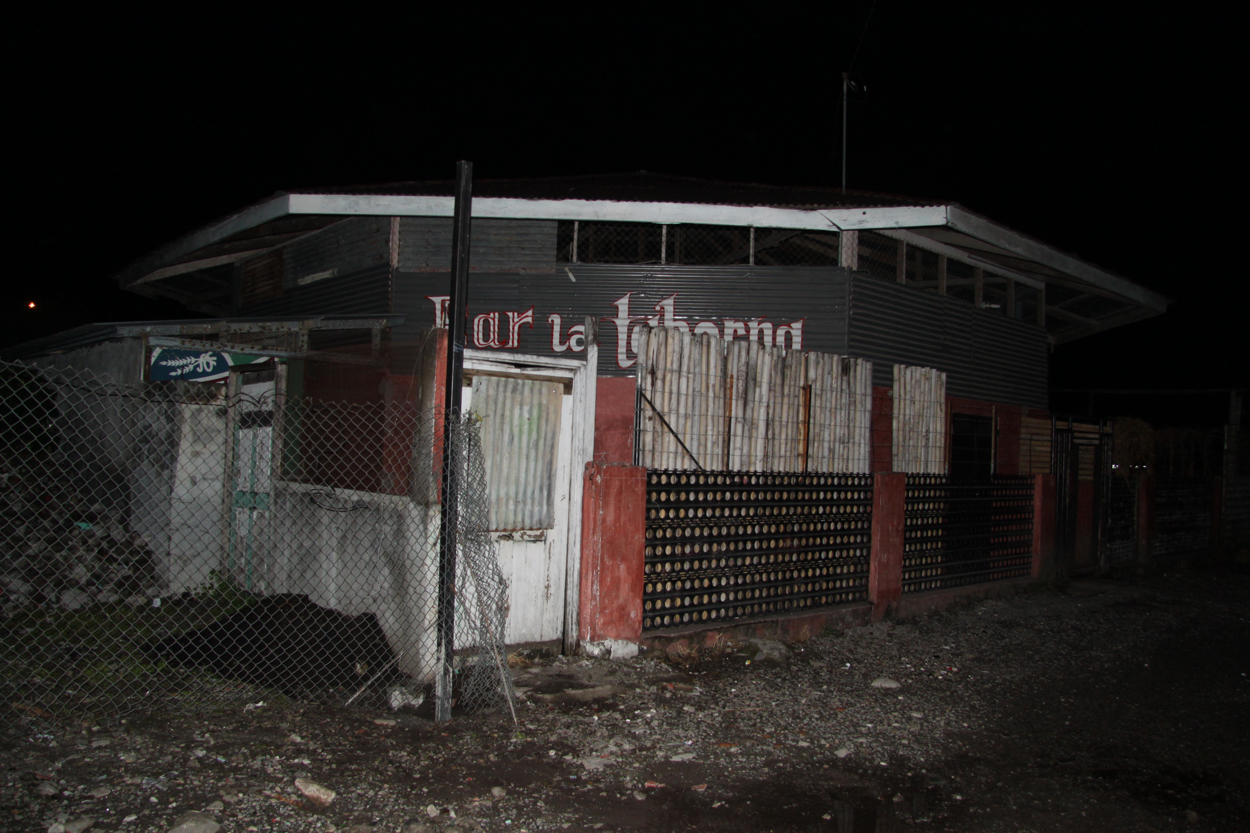Short Story: Ngobe Indian Wife Fights
In December of 2009, my wife, Joyce, and I traveled to Panama for a quick getaway with our friend Bill. Halfway through the trip, we hung up the rental car keys for a few days of relaxation in Boquete, a quaint village nestled into the western highlands of Panama, just a stone’s throw east of the Costa Rican border.
We lodged at Boquete Garden Inn, a charming boutique bed and breakfast set upon a canvas of vibrantly colored tropical flowers, birds, mountain streams and a sky that was much bluer than the smoggy blue-gray we’re used to breathing around New York City. Simply put, it’s a scene that would surpass even my own imaginative projection of what paradise should be.
Despite typically having well-planned travel schedules, we tossed itineraries aside in Boquete and kicked back. Only one daily event was scheduled on our iPhone calendar apps – Boquete Garden Inn’s free drink for lodge guests at 5pm. We’re definitely not ones to pass up free drinks, or admittedly, even drinks we have to occasionally pay for!
There’s a certain magic that happens in a local watering-hole, regardless of what country you are in. It’s a magic that transcends language, age and more importantly, culture. It’s the aura of making connections with people you normally wouldn’t have had the chance to meet. In Panama, it was hearing passionate recollections of two lifetimes of travel from Pierre and Janice, 80-something year olds from Quebec celebrating their 60th wedding anniversary with a whirlwind four-month world trip. In Vietnam, it was meeting Raj Gorla, now a great friend, on board our chintzy and touristy boat’s bar in HaLong Bay, half a world away from home, only to discover that he lived five minutes up the street from us in New Jersey.
At Boquete Garden Inn’s small bar, the magic happened when Joyce, Bill and I cashed in on our free drinks and struck up a conversation with the bartender, Dennis, who is also the owner of the inn. Dennis’s wavy blond hair, chiseled, stern and weathered face was tough and thoughtful, but young at the same time. I chalked him up to the middle-aged surfer type.
American expats, Dennis and his wife Janine, pursued their dream of living abroad and moved to Panama from the states in 2005. They purchased the inn and have since converted it into one of the best rated bed and breakfasts in Boquete.
Having access to someone like Dennis when you’re traveling beats even the best tips that any Frommer’s or Lonely Planet guide has to offer. With Dennis’s veritable treasure trove of local information on tap, we attempted to find out what made Boquete tick and what the must-sees were in town.
Dennis rattled off a list of main attractions. The Café Ruiz coffee plantation (outstanding coffee and certainly a highly recommended to-do – heck, this attraction alone warrants a separate blog post), nature hikes, decent bars and the least touristy and most authentic restaurants in town. All great suggestions, but these items were already on our itinerary.
Perhaps sensing my lackluster response to the attractions, Dennis raised an eyebrow and leaned forward. It’s a look I’ve seen before at Chinese restaurants. A waiter, noticing my dismay with the pu pu platter and General Tso’s chicken options on the menu (which, by the way, is a big indicator that you’re in an Americanized Chinese restaurant), would whip out the coveted Chinese-only menu. “Sir, you may find this menu more to your liking. It has real Chinese food.”
As Dennis’s voice deepened, we knew we were about to get the Chinese-only menu of the real Boquete experience. “There is one other experience you might want to check out. But, if you do go, watch it from a distance. Whenever I see it, I see it only from my car,” he warned.
“Okay, now you’re talking! What is it?”
“The Boquete wife fights.”
Panamanian housewives, clad in two piece bikinis, wrestling for their honor in mud or jello pits? I admit, this was the first thing to pop into my mind. But, as Dennis’s tale would prove, life is sometimes stranger than fiction (or my own semi-perverted mind.)
In downtown Boquete, there is a local bar that is frequented by Ngobe Indians, native Panamanians that are non-Spanish speaking. The Ngobe are the primary labor force behind Boquete’s vibrant coffee plantation operations. After a hard day’s work picking coffee beans and transporting large bales of the stuff, the natives unwind at the downtown Boquete bars with their co-workers, friends and families.
Ngobe Indian men have a unique form of conflict resolution. Whenever a serious conflict arises, the men would hit the bar after work, liquor up to the desired level of drunkenness, remove their shirts and pour out into the street with their fellow bar patrons. A one-on-one fist fight would ensue between the two shirtless men, usually on top of broken shards of glass bottles in the alleyway. The last man standing was the winner with the conflict resolved in his favor.
I know what you’re thinking. Why are these referred to as wife fights? That, my friends, is the curve ball in this tale.
The winner of the fight not only declares the resolution to the conflict, he acquires the loser’s wife as a prize. Essentially, the wife gets transferred, like property, to the winner. Dennis didn’t go to the extent of calling this slavery or even indentured servitude, but I can’t quite find any other applicable name for it.
As legend would have it, there is a very conflict prone Ngobe Indian with Mike Tyson like reflexes and boxing skill. Over the years, he’s acquired over twenty wives through the wife fights. (Having twenty wives hardly sounds like a winning scenario to me. Sorry ladies!)
Joyce, Bill and I are accustomed to hearing tall tales and legends during our travels, and we’re also used to taking them with the proverbial grain of salt. During a recent trip to Paris, Emmanuel, my local guide, recited the shocking tale of a barber and chef crime duo that involved butchering local students from nearby universities in the Latin Quarter as a convenient and low cost source of meat for the chef’s restaurant’s delectable pâté special. Researching these legends on the Internet usually leads down the same road. An ancient story gets passed down from generation to generation, but the validity of the tale is pure speculation and most likely exaggerated, if not completely fabricated. Investigating Dennis’s wife fight story via Google, I found nothing to substantiate such a wild claim. Not one story from a tourist, blog post from a local or a Tripadvisor.com article from an inquisitive amateur travel journalist.
Nonetheless, Joyce, Bill and I, the adventurous and sometimes foolhardy trio that we are, ventured into downtown Boquete to explore the location of the bar that Dennis identified as the ground zero of the wife fights.
We saw nothing out of the ordinary. A run-down bar, Bar La Taberna, stood in sheer neglect at the end of a dilapidated alleyway. The bar’s exterior walls were made partially of cardboard and scrap sheet metal. It looked more like a slum than a place of business. The lights were off and the alleyway was quiet. We left dismayed.
The second night, we returned armed with a few cans of Hamm’s, a cheap American beer from St. Paul that we were surprised to find in a remote Panamanian comisariato. Prepped for a longer stake out at the entrance of the alleyway leading to Bar La Taberna, we stood watch. Slowly slipping our beer, we blended in with the town folk about as effectively as Paris Hilton at an quantum physics convention.

Bill and I on the stake-out with Hamm’s beer. Yes, somehow, a St. Paul, Minnesota brew was big in downtown Boquete.
Still… nothing out of the ordinary.
Our last night in Boquete, and once again back at Boquete Garden Inn’s bar for our free 5pm booze, we professed to Dennis that after two days of Sherlock Holmes activity around the wife fight bar, we saw no elementary evidence that the bar had even been in use recently.
Dennis smiled, coyly, “Patience. It doesn’t happen every night. And… be careful,” he said.
We had our last dinner in downtown Boquete, as we had the previous two nights. Collectively, we somewhat reluctantly decided to give the bar another chance. Toting along even more cheap beer, we staked out the corner of the street leading to the La Taberna bar, once again.
Immediately, there was something noticeably different about the scene. Broken glass was strewn throughout the alleyway in front of Bar La Taberna; there was an old man, laying on the sidewalk in a drunken stupor and unable to get up; muffled thumping bass, possibly from Frankie Goes to Hollywood’s Relax – or maybe some other 80’s hit, emanated from the bar. The vibe surrounding Bar La Taberna was… different.
As we nonchalantly observed the alleyway, the doors burst open and a group of thirty or so Ngobe Indian natives streamed out, chanting, yelling and smashing beer bottles against the ground.
A circle formed with two men clearly taking front and center over the shards of broken glass in the street. Their shirts, promptly ripped off, were flung to the side. Fists flew, legs kicked and in an instant, the fight became a radiant blur from our distant vantage point. The distinct thud of fist against face was our only play-by-play.
Bewildered by what we were witnessing, I plotted the best way to covertly take my point-and-shoot camera out of my pocket to capture the situation. After all, a tale of this magnitude would be much more believable if we actually caught it on film.
I reached into my pocket and felt around for my Canon camera. As I glanced back at the fight, the more we turned our attention to it, the more attention we garnered from the natives. They clearly noticed our interest in their activities.
Before I could formulate a strategy for a photograph, one man spectating the fight caught our gaze and walked hastily toward us. No more than four and a half feet tall, he had Arnold Schwarzenegger’s muscle mass (during his pre-Governator years) condensed into his small frame. His neck was nearly the size of my thighs and I have no doubts that he could’ve arm-wrestled me, Bill and Joyce, at the same time, into tearful oblivion. He would’ve likely won without casting a bead of sweat and probably would’ve walked away with my wife as his prize.
Locking eyes with us, he curled his upper lip into the best Elvis impression I’ve seen, grunted like a howler monkey and smashed his empty beer bottle against the ground just a few yards away from us. My hand, still on the camera in my pocket, went limp. I am usually a brave photographer in unsettling circumstances, but for once, I wasn’t. I also wasn’t about to find out whether he thought kindly of me asking him to say cheese. The man continued on, either displeased with the outcome of the fight or maybe simply because his beer bottle was empty. Either way, his grunting gradually faded into the night as he walked on.
There was clearly a winner to the fight. While the loser wasn’t pummeled into unconsciousness as we all expected, pain was certainly inflicted on both fighters and the less injured fighter was declared winner. The influence of alcohol wearing off, the crowd dispersed back into the bar after the man presumably asserted his stance on the conflict to be resolved in his favor.
Women did line the outskirts of the fight. What we didn’t witness was an actual transaction of wife ownership. To date, we’re note sure if that part of the tale was legitimate. Perhaps it occurred back inside the bar or maybe the losing man presented the winner with a wife I.O.U so that he could get his marital affairs in order before the transfer of title. I don’t know… your guess is as good as mine, Joyce’s or Bill’s… and maybe even Dennis’s.
What we do know is that the majority of Dennis’s tale turned out to be true. Joyce, Bill and I have traveled the world and despite this exposure to great and varied experiences, we still cast doubt on Dennis’s story our first night in Boquete. Had we dismissed the tale completely, we would have missed out on what remains, undoubtedly, the strangest travel experience we’ve all had to date. The experience was a poignant reminder that we travel not only to see the similarities in people that we meet, but also to see the intense, and sometimes shocking, differences. It’s one of the many ways travel can be personally transformative and enriching.
At the very least, it’s given me a new appreciation for the various (civilized) tools we have for resolving conflict, and that none of these risk the loss of my wife. Or, even worse… accumulating twenty.




Following up on this –
I bit the bullet and went a few weeks ago to check it out. I parked my vehicle at the corner of the alley where the bar is located. Luckily my SUV had tinted windows so I was basically hidden from view. I saw several pretty brutal fights.
From all the Panamanians I spoke with about, it’s very true. However, the indigenous wives do not go to the winner permanently – only for one day. Apparently, they put the wives to work (and who knows what else!)
Everyone laughs at me when I tell them I went – They say “You should see the actual ‘Wife Fights’!! The wives will actually fight each other (not at the bar though) and the winner gets the loser for an entire year to work. Ouch!!
Andrea – thanks for writing and I’m sorry for the delay in response! It was an amazing thing to have seen. I probably would’ve chalked it up to folklore had I not seen it in person!